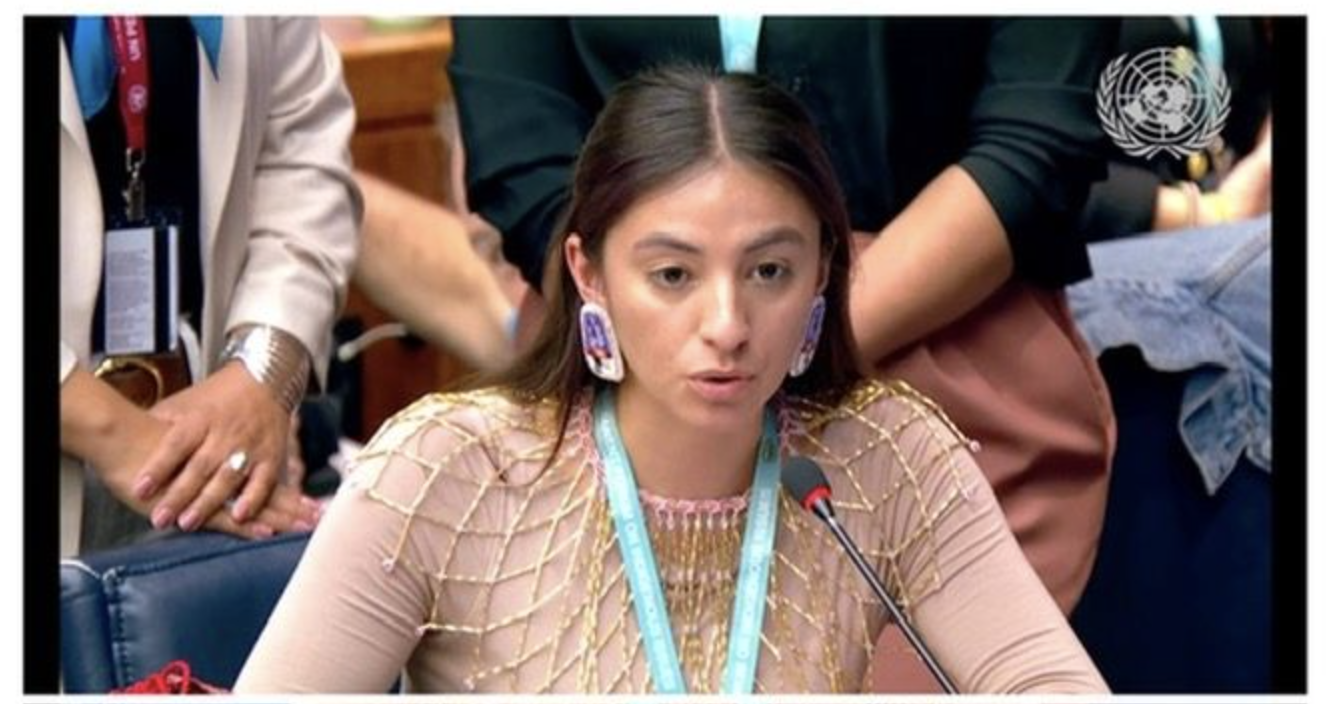
- Details
- By Kaili Berg
Carrie Johnson (Chickasaw Nation / Pawnee Nation), a 23-year-old student member of the Indigenous Journalists Association (IJA), called for stronger protections and funding for Indigenous media during the United Nations Permanent Forum on Indigenous Issues (UNPFII) this week.
Speaking at UN headquarters on April 23, Johnson emphasized that storytelling has always been critical to Indigenous sovereignty and warned that many tribal media outlets today do not have full freedom to publish the stories that matter most to their communities.
Johnson, a graduate student at New York University on a full IJA scholarship, spoke from personal experience, referencing her work with the Chickasaw Times, the official newspaper of the Chickasaw Nation.
Johnson explained that although tribal media often have deep community knowledge, they are sometimes required to seek approval from tribal governments that prioritize promoting images of power, wealth, and success.
“This controlling of narratives is a protective reaction to how Indigenous peoples' stories are told by mainstream media, where harmful stereotypes have become normal,” Johnson said.
Johnson pointed to concerning examples she has witnessed firsthand, including a lack of reporting on cases of missing and murdered Indigenous people (MMIP), environmental issues that are kept under the radar, intimidation from government entities, and confusion among citizens about funding for large tribal projects.
Johnson said that these gaps in reporting leave Indigenous communities divided and uninformed about critical issues.
Johnson cited Article 16 of the United Nations Declaration on the Rights of Indigenous Peoples (UNDRIP), which affirms that Indigenous peoples have the right to establish their own media in their own languages and to access all forms of non-Indigenous media without discrimination.
She urged UNPFII members to encourage states to legally recognize Indigenous media rights, fully fund Indigenous-owned media outlets, and develop respectful, culturally informed relationships with sovereign tribal nations.
She also called on tribal governments to commit to upholding freedom of the press within their own nations, stressing that tribal media are often the primary source of information for citizens.
“While tribal media outlets have the experience and depth of understanding to provide nuanced coverage, they may not have the freedom or resources to fully report on issues that concern their communities,” Johnson said. “We make these calls to the members to support Indigenous peoples' right to free press and self-determination through our journalism.”
As part of the week’s activities, IJA and Grist also co-hosted a workshop titled “Share Your Story: Communicate Effectively with Journalists,” which helped Indigenous leaders sharpen their storytelling skills and better understand how to communicate with media outlets.
Since its founding, IJA’s training programs have reached more than 200 Indigenous participants globally, with support from the Canadian Commission for UNESCO (CCUNESCO), Cultural Survival, and the Project Access Indigenous Partnership.
In addition to her work with IJA, Johnson is currently directing her first documentary, A Breath on the Flames, which focuses on Indigenous resilience and storytelling.
More Stories Like This
Native News Weekly (August 25, 2024): D.C. BriefsNative Bidaské: The Illusion of Freedom and the Myth of America 250, Leonard Peltier Speaks Out
Monday Morning (March 2, 2026): Articles You May Have Missed This Past Weekend
Native News Weekly (March 1, 2026): D.C. Briefs
Scope Narrowed, Report Withheld: Questions Mount Over Michigan Boarding School Study
Help us defend tribal sovereignty.
At Native News Online, our mission is rooted in telling the stories that strengthen sovereignty and uplift Indigenous voices — not just at year’s end, but every single day.
Because of your generosity last year, we were able to keep our reporters on the ground in tribal communities, at national gatherings and in the halls of Congress — covering the issues that matter most to Indian Country: sovereignty, culture, education, health and economic opportunity.
That support sustained us through a tough year in 2025. Now, as we look to the year ahead, we need your help right now to ensure warrior journalism remains strong — reporting that defends tribal sovereignty, amplifies Native truth, and holds power accountable.
 The stakes couldn't be higher. Your support keeps Native voices heard, Native stories told and Native sovereignty defended.
The stakes couldn't be higher. Your support keeps Native voices heard, Native stories told and Native sovereignty defended.
Stand with Warrior Journalism today.
Levi Rickert (Potawatomi), Editor & Publisher


